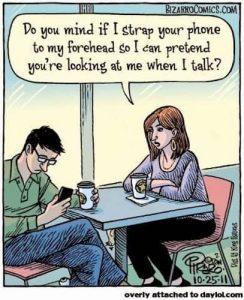 Eight seconds: that’s how long, on average, 2,000 participants of a study sponsored by Microsoft were able to focus upon a task before helplessly switching their attention to another activity (1).
Eight seconds: that’s how long, on average, 2,000 participants of a study sponsored by Microsoft were able to focus upon a task before helplessly switching their attention to another activity (1).
The more people reported reliance upon electronic devices in their daily lives, the less they were able to sustain their attention.
The results of the study revealed the new adult attention span to be, on average, four seconds less than the 12-second attention span 12 years ago and one second less than the attention span of a goldfish.
That’s right; a creature you can win in a carnival booth has a better ability to concentrate than a smartphone-addicted adult.
So what does this mean to your life and what can you do to extend your attention span? If we can stay focused for a few more minutes, I’ll discuss the negative impact of a shrinking attention span and the answer science has discovered for increasing your focus.
The featured photo on this page by @esmith_images (Instagram) says it all. How many precious moments might you miss each day when absorbed in your gadgets?
Plugged In Means Tuned Out
The biggest factor to human happiness isn’t money; it’s one’s ability (or inability) to be attentive to the present moment. In other words, how mindful you are at any time. That’s what Matt Killingsworth, an expert on happiness studies, suggested in a TED talk based on his research findings (2).
The results were simple: the more people’s minds wandered from what they were doing, the less happy they were.
If you’re someone who adopted digital technology early in life, use social media frequently, or are a “digital native” age 18-24, chances are you find it challenging to concentrate for sustained periods of time.
You probably have an urge to check your phone when you have nothing better to do. You may find yourself having random thoughts or daydreams in the middle of a school or work project. You may even have to work late or on weekends to make up for unproductive time spent posting to social media.
These are all symptoms of “digital overload,” a condition University of California neuroscientists have warned can cause anxiety and over-stimulation (3).
Personal Disconnection
Additionally, your relationship with your family or friends can suffer. When was the last time you and your friends spent time together without someone checking his or her phone during a lull in conversation?
And have you noticed that once one person picks up his or her phone, someone else will follow suit until everyone is staring at a screen instead of engaging one another?
No wonder people have reported increased feelings of loneliness or depression the more they participate in social media; it isolates them from friends who are physically present and forces them to compare their lives to unrealistic tidbits strangers choose to post online (4).
A shorter attention span also means a more difficult time building trust within a romantic relationship. A study by the University of Essex revealed if couples try to talk with each other when they’re in close proximity to a cell phone, even if they aren’t using it, they feel less satisfied with their relationship and less confident in each others’ abilities to empathize (5).
If one partner picks up his or her phone in the middle of a discussion, the message, while perhaps unintentional, is still hurtful: “My Twitter feed is more important than what you have to say.”
Attending to the Present Moment
The good news is you can combat the mental and emotional pitfalls of technology overload by practicing mindfulness. In a University of Santa Barbara study,  students who participated in mindfulness practice for eight days saw an increase to their attention, focus and GRE scores (6).
students who participated in mindfulness practice for eight days saw an increase to their attention, focus and GRE scores (6).
Other research has documented the changes mindfulness meditation can make to brain regions that control memory and stress regulation (7).
When you stay present in the moment you are living right now, you’ll find your attention will stretch to encompass all that truly matters in your life and filter out the noise and chatter of living in a digital world.
If you’d like to learn some easy mindful approaches to help buffer you from the effects of digital overload and increase your attention span, check out ‘7 Strategies to Maintain Mindfulness in the Modern World.’
Got any comments, questions or thoughts about this post? Feel free to post them in the comments section below.
(1) http://advertising.microsoft.com/en/cl/31966/how-does-digital-affect-canadian-attention-spans
(2) https://melliobrien.com/ted-talk-happiness-is-mindfulness/
(3) https://melliobrien.com/scientists-warn-of-the-dangers-of-digital-overload/
(4) http://www.forbes.com/sites/alicegwalton/2015/04/08/new-study-links-facebook-to-depression-but-now-we-actually-understand-why/
(5) http://spr.sagepub.com/content/early/2012/07/17/0265407512453827.abstract
(6) http://www.theatlantic.com/health/archive/2013/05/study-meditation-improves-memory-attention/275564/
(7) http://www.sciencedaily.com/releases/2011/01/110121144007.htm
Thank You For Listening
I really appreciate you choosing to listen or read about mental strength with me. If you found benefit from today’s episode/post and you think others might benefit from hearing about it, go ahead and share it using the social media buttons below.
I would also be super grateful if you would consider taking a minute or two to leave an honest review and rating for the show on Apple Podcasts. They’re extremely helpful when it comes to reaching our audience and I read each and every one personally!
Finally, remember to subscribe to the podcast on Apple Podcasts to make sure that you never miss an episode.

